Albanese’s speech decoded: it didn’t reach the heights of campaign oratory but that was never its aim

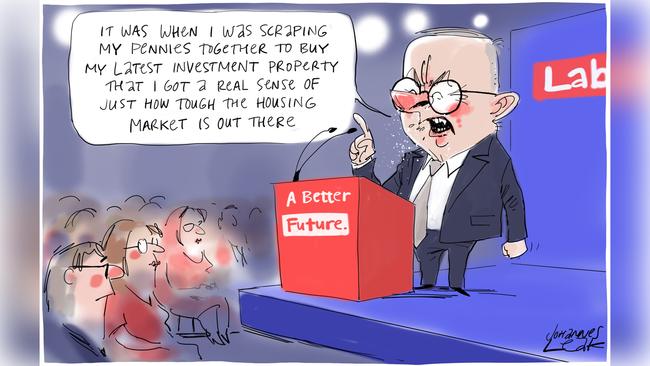
These speeches are always informed by polling and focus groups to present the most persuasive case to voters.
In decoding the speech, the party’s strategy and tactics are laid bare.
Values and work
Albanese: “You can choose a government that honours your values and rewards your hard work. A government that holds no one back — and leaves no one behind.”
This speech sought to frame the contest as a clear choice for voters. There is a difference between the major parties on care, manufacturing, work, energy and defence, Albanese argued. He said the word “choose” six times in one minute.
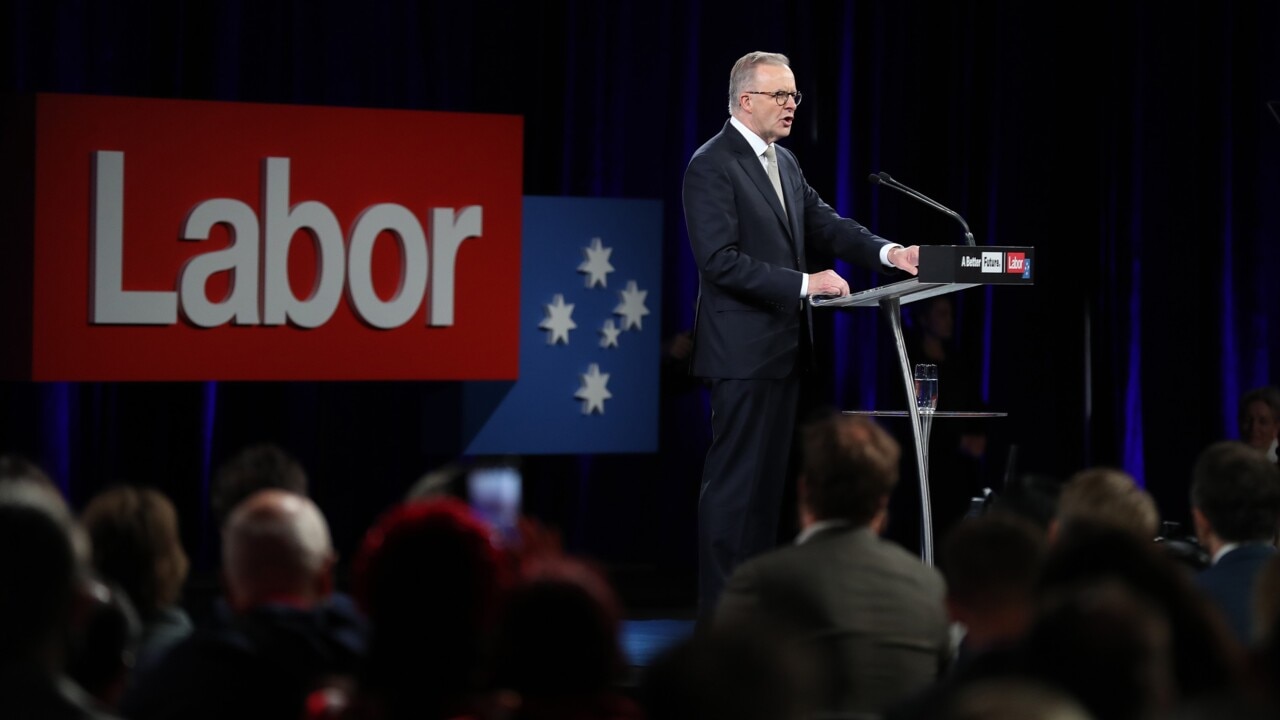
Doing better
Albanese: “I know Labor can do better. I know Australians deserve better.”
The Labor leader stood against a backdrop that read, “A Better Future”. The word “better” is a key part of Labor’s campaign lexicon. It is deliberately low-key. No revolution. No sweeping agenda. Just better than the Coalition.
Labor’s team
Albanese: “We are a team with the experience, the intellect, the compassion and most importantly the ambition to shape Australia’s future.”
Being in Covid isolation gave the Labor team an opportunity to step up. Jason Clare, who gave a brilliant speech before Albanese, was the star performer. Albanese acknowledged Penny Wong, Jim Chalmers, Richard Marles and Katy Gallagher.
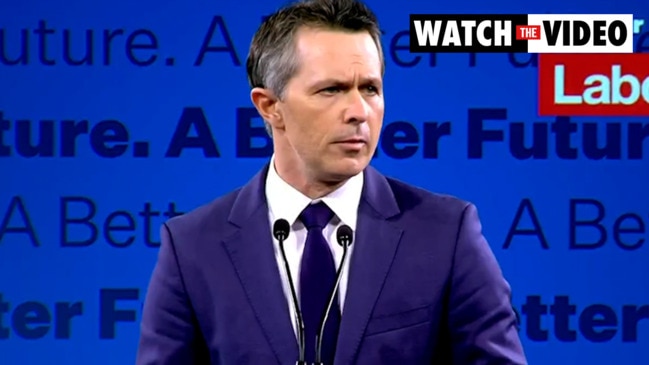
The Labor family came out in force. West Australian Premier Mark McGowan got the biggest cheers. Former prime ministers Paul Keating and Kevin Rudd sat in the front row near new South Australian Premier Peter Malinauskas.
There was a touch of Hollywood with Russell Crowe narrating a video.
Daniel Andrews and Anastasia Palaszczuk were notably absent.
Covid-19
Albanese: “Covid … revealed the vulnerabilities of our economy. The big question for Australia is – are we going to learn the lessons from this?”
Labor wants to make this election about the future versus the past. Albanese argues that the past three years have been “wasted” and now is the time to “seize the moment” with reforms to ensure a better future.
The future
Albanese: “Australia: if we stand still, we will be left behind. If we don’t shape the future, the future will shape us.”
This was the only wrong note in Albanese’s speech. It is known as a “reversible raincoat” among speechwriters. Think John F. Kennedy’s “Ask not what your country can do for you – ask what you can do for your country.”
Albanese’s attempt at a rhetorical flourish did not work. It doesn’t make sense. We can shape the future but even if we don’t do anything, the future will still shape us. Sounds like it was written by committee.
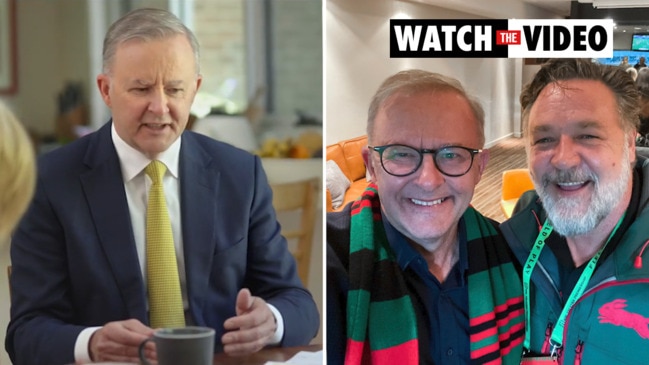
Scott Morrison
Albanese: “Scott Morrison says you don’t have to like him, but it’s better the devil you know.”
The election is also about character. Labor knows voters are not fully sold on Albanese. Morrison is not as popular as he was three years ago. But the risk for Labor is that voters stick with Morrison anyway. So Albanese listed his flaws and faults, from bushfires and floods to vaccine and RAT supply, cost-of-living pressures and the aged-care crisis. Albanese promises only that he “can do better”.
Climate and energy
Albanese: “(Labor) will drive investment in cheap, renewable energy … It will mean cheaper power for homes and businesses. We will end the climate wars.”
Climate change and energy policy contributed to Labor losing the last election. This time, the party is keen to neutralise the issue by emphasising how its policies will lower power bills and improve reliability. Nothing scary.
Manufacturing
Albanese: “We’ll bring manufacturing home.”
Through innovation, research and planning, Labor argues it can revive manufacturing. Albanese announced a new value-adding policy.
Voters do want to make things in Australia again. It is a vote winner. But we won’t see a return to the large-scale manufacturing of the post-war era.

Infrastructure
Albanese: “Under this government, nation-building has (been) replaced by pork-barrelling.”
Infrastructure – roads, rail, ports, broadband – boosts jobs, provides training opportunities and turbocharges productivity. But the government’s grant programs have favoured their own electorates. But where was Albanese’s much loved Very Fast Train?
Women
Albanese: “Women workers have had a tough two years. And I want to tell you that we see you.”
Women were a big part of the speech with promises to lift their pay, provide secure jobs and careers, housing and financial security. Women voters, according to polls, still favour Morrison over Albanese. But Labor is appealing strongly for their vote.
Aged care
Albanese: “Our plan (is) to restore quality and humanity to aged care. Older Australians built this country. You deserve dignity and respect in your later years, not neglect.”
Improving the standard of care and accountability of providers will resonate, especially, with older Australians and their adult children contemplating their care in later years. A promise to restore “quality and humanity” is a good line.
Home ownership
Albanese: “A plan to help more working families realise the dream of owning their own home.”
Labor’s Help to Buy program is smart policy that will appeal to young Australians priced out of the housing market. This was the best part of Albanese’s speech as he explained that home ownership is about security, pride and belonging.
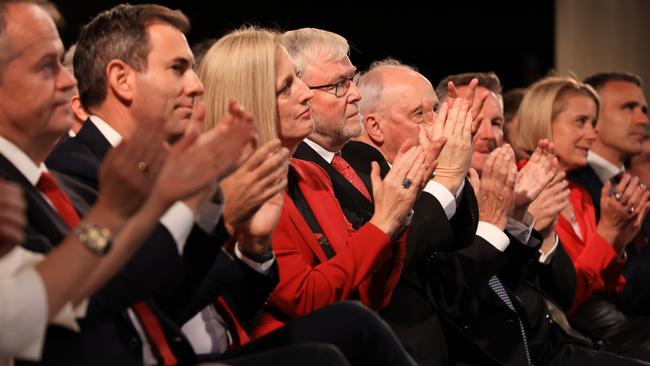
Being prime minister
Albanese: “As your prime minister, I won’t run from responsibility. I won’t treat every crisis as a chance to blame someone else. I will show up, I will step up, I will bring people together.”
This election is as much about character and competence as it is about policy.
Leadership matters. Albanese wants to make the election a referendum on Morrison.
This was, overall, an effective speech by Albanese that articulated the party’s limited policy agenda, identified Morrison’s vulnerabilities, and outlined what a Labor government would do. He should have given it months ago.
While it did not reach the heights of campaign oratory, that was never its aim. Albanese’s central pitch to voters is that Labor “can do better”. It is a low bar but one it thinks it can meet.







Anthony Albanese’s campaign launch speech was infused with Labor tribalism, delivered with his usual blend of indignation and passion, and gave voice to his party’s values and policies with a sharp critique of Scott Morrison.